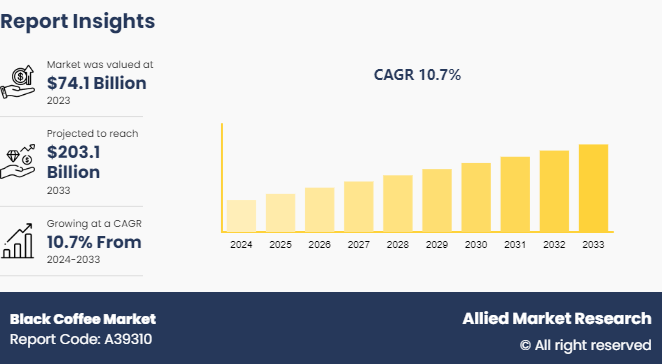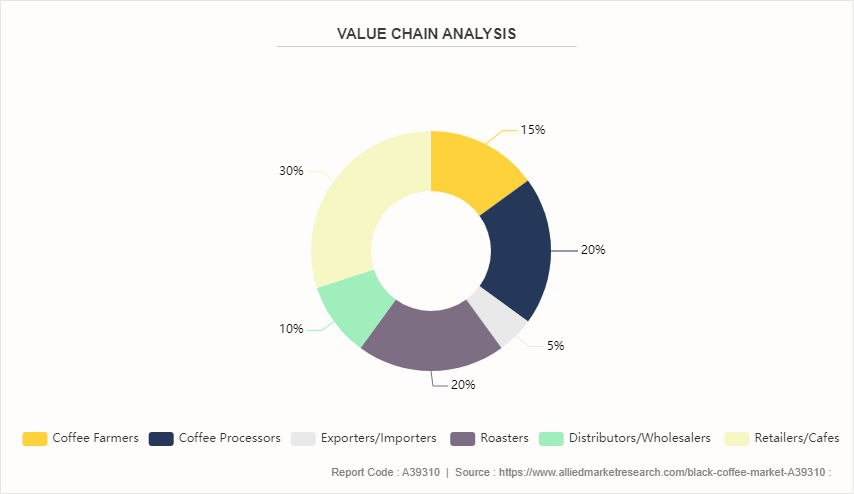Black Coffee Market Research, 2033
Market Introduction and Definition
The global black coffee market size was valued at $74.1 billion in 2023, and is projected to reach $203.1 billion by 2033, growing at a CAGR of 10.7% from 2024 to 2033. Black coffee, a brewed beverage prepared from roasted coffee beans. is served without any added flavorings, milk, cream, or sugar. It is valued for its strong, deep flavor as well as the coffee beans' inherent aromatic qualities. Increase in demand for low-calorie beverages and the global expansion of coffee culture offer tremendous growth opportunities for the market.

Key Takeaways
- The black coffee market study covers 20 countries. The research includes a segment analysis of each country in terms of value for the projected period.
- More than 1, 500 product literature, industry releases, annual reports, and other such documents of major black coffee industry participants along with authentic industry journals, trade associations' releases, and government websites have been reviewed for generating high-value industry insights.
- The study integrated high-quality data, professional opinions and analysis, and critical independent perspectives. The research approach is intended to provide a balanced view of global markets and to assist stakeholders in making educated decisions in order to achieve their most ambitious growth objectives.
Key market dynamics
Growing consumer knowledge of the health advantages of black coffee, which is viewed as an antioxidant-rich, low-calorie beverage that can increase mental alertness and expedite metabolism, is a key driver of the market. A growing number of consumers are choosing black coffee over sweet, high-calorie options due to health concerns.
In addition, rise in popularity of specialty coffee culture is also driving the black coffee market growth. There is a growing market for premium, single-origin, ethically sourced black coffee as consumers become more informed and discriminating about their coffee preferences. The growth of specialty coffee shops and cafés, which highlight the distinct flavors and brewing methods of black coffee and increase its attractiveness, is another factor driving this trend.
Ready-to-drink (RTD) black coffee products have become more popular as a result of modern customers' fast-paced lifestyles, which demand convenient access to their favorite beverages without sacrificing quality. The market is growing rapidly, and advancements in preservation and packaging methods ensure the flavor and aroma of black coffee are retained.
Furthermore, consumers are becoming more concerned about sustainability and ethical sourcing, which is fueling demand for fair trade and ecologically friendly black coffee firms during black coffee market forecast. Thus, companies are catering to customers who are socially and environmentally diligent by providing fair-trade and certified organic black coffee options.
However, the market faces challenges owing to issues such as climate change-related price volatility of coffee beans and political factors that impact coffee-producing regions. Fierce competition from other drinks such as tea and energy drinks, also hinders the market growth. Despite these challenges, the black coffee market is still expanding due to trends that prioritize sustainability, quality, convenience, health, and sustainability.
Value Chain Analysis of the Global Black Coffee Market
The production and harvesting of coffee beans in coffee-producing countries across the world is the first step in the value chain of the global black coffee market share. After harvesting, beans are processed to create their distinct flavor profiles. This process involves drying, grinding, and roasting. After roasting, the beans are ground and packaged before being sold to a variety of retail outlets, such as grocers, specialty coffee shops, and online retailers. Retail sales are driven by customer demand, which is boosted by marketing initiatives and consumer education regarding the origin and quality of beans. The market also comprises suppliers of packaging and manufacturers of coffee brewing equipment. The integration of ethical sourcing and sustainability activities into the value chain is on the rise, impacting market dynamics and customer preferences.

Market Segmentation
The black coffee market is segmented into type, application, and region. On the basis of type, the market is divided into dark roast coffee, black instant coffee, black silk coffee, black iced coffee, black ground coffee, and organo gold black coffee. On the basis of application, the market is segmented into the drink-to-go, supermarket service, conventional store service, and personal use. Region-wise, the market is analyzed across North America, Europe, Asia-Pacific, and LAMEA.
Regional/Country Market Outlook
Black coffee is a popular beverage in the U.S. and Canada due to its ease of use and potential health advantages. Specialty and artisanal coffees are highly preferred in the market, and customers have started to place a higher value on origin and quality. Urban areas are dominated by large chains and specialty coffee shops that serve sophisticated customers looking for distinctive flavor profiles and environmentally friendly sourcing methods.
Moreover, black coffee is a significant part of the European culture, particularly in nations such as France and Italy where traditional coffee rituals and espresso are deeply embedded. The market in Europe is mature but continues to evolve with the rise of third-wave coffee movements, emphasizing small-batch roasts and direct trade practices. Premium products are in high demand due to consumers' increased interest in premium, single-origin black coffees in nations like Germany and the UK.
In addition, black coffee is in high demand in nations such as South Korea and Japan, where consumers like both conventional and modern brewing techniques. While South Korea embraces trendy coffee shops and innovative brewing technologies, Japan's coffee culture combines traditional tea ceremony aesthetics with careful brewing processes. Southeast Asia's emerging economies, including Vietnam and Indonesia, are driving the region's growth due to rise in urbanization and a middle class that is increasingly demanding high-end coffee experiences.
Latin America, a major producer of coffee, contributes a large amount of the world's coffee beans and has a significant local market for black coffee. Large amounts of coffee are consumed domestically in nations such as Brazil and Colombia, where a range of brewing techniques, from classic espresso to more modern cold brews, are popular. The local coffee cultures, the state of the economy, and the existence of large international coffee corporations have an impact on the market dynamics in the region.
Furthermore, black coffee is frequently consumed as part of daily rituals and customs in places such as the Middle East and Africa, where it has cultural importance. Turkey and other nations have a long history of coffee consumption, with an emphasis on complex serving techniques and rich, dark roasts. These regions' markets combine traditional methods with contemporary trends in coffee consumption, with urban consumers showing an increasing interest in specialty coffees and premium blends.
Competitive Landscape
The major players operating in the black coffee market include Starbucks, UCC, Pacific Coffee, Royal Kona, Chameleon, Craftsman of Coffee, Kohana Coffee, Califia Farms, High Brew, and Volcanica Coffee.
Recent Key Strategies and Developments
- In June 2023, Lavazza established a joint venture with a prominent Australian coffee distributor to fortify its position in the Australia and New Zealand black coffee sectors.
- In October 2023, a new line of organic black coffee blends with a focus on sustainability was developed by Coffee Bean & Tea Leaf, catering to the tastes of Southeast Asian customers.
- In March 2023, a new line of black coffee pods compatible with Keurig brewing systems was introduced by Keurig Dr. Pepper in response to consumer demand for convenience.
- In August 2023, Peet's Coffee focused on improving the customer experience by introducing specialized black coffee options in several new flagship locations that it launched in major cities.
Key Sources Referred
- National Coffee Association (NCA)
- Specialty Coffee Association (SCA)
- European Coffee Federation (ECF)
- Japan Coffee Association
- Brazilian Association of Coffee Industry (ABIC)
- Colombian Coffee Growers Federation (FNC)
- International Coffee Organization (ICO)
- Specialty Coffee Association of Europe (SCAE)
- Coffee Quality Institute (CQI)
- Australian Specialty Coffee Association (ASCA)
Key Benefits For Stakeholders
- This report provides a quantitative analysis of the market segments, current trends, estimations, and dynamics of the black coffee market analysis from 2024 to 2033 to identify the prevailing black coffee market opportunities.
- The market research is offered along with information related to key drivers, restraints, and opportunities.
- Porter's five forces analysis highlights the potency of buyers and suppliers to enable stakeholders make profit-oriented business decisions and strengthen their supplier-buyer network.
- In-depth analysis of the black coffee market segmentation assists to determine the prevailing market opportunities.
- Major countries in each region are mapped according to their revenue contribution to the global market.
- Market player positioning facilitates benchmarking and provides a clear understanding of the present position of the market players.
- The report includes the analysis of the regional as well as global black coffee market trends, key players, market segments, application areas, and market growth strategies.
Black Coffee Market Report Highlights
| Aspects | Details |
| Market Size By 2033 | USD 203.1 Billion |
| Growth Rate | CAGR of 10.7% |
| Forecast period | 2024 - 2033 |
| Report Pages | 250 |
| By Type |
|
| By Application |
|
| By Region |
|
| Key Market Players | Califia Farms, Kohana Coffee LLC., Volcanica Coffee, UCC, Craftsman of Coffee, High Brew Coffee, Royal Kona, Chameleon, Pacific Coffee, Starbucks |
Upcoming trends in the global black coffee market include a rise in specialty and organic coffee consumption, increasing popularity of cold brews, and growing demand for ready-to-drink options.
The leading application of the Black Coffee Market is in daily beverage consumption, driven by increasing health consciousness, as it is low in calories and free from additives like sugar and cream.
The largest regional market for black coffee is North America, driven by high consumption rates, a strong coffee culture, and increasing demand for specialty coffee varieties.
The global black coffee market was valued at $74.1 billion in 2023, and is projected to reach $203.1 billion by 2033, growing at a CAGR of 10.7% from 2024 to 2033.
The major players operating in the black coffee market include Starbucks, UCC, Pacific Coffee, Royal Kona, Chameleon, Craftsman of Coffee, Kohana Coffee, Califia Farms, High Brew, and Volcanica Coffee.
Loading Table Of Content...



